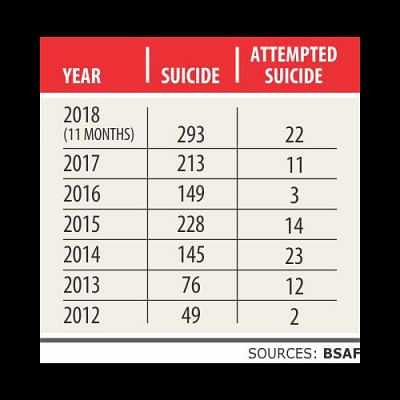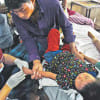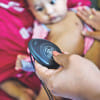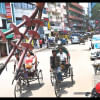Child suicide on the rise

The number of children dying by suicide has increased in recent years largely due to what experts believe a lack of awareness among family members and teachers about the stress in adolescence.
At least 293 children died by suicide and 22 others made attempts in the last 11 months, according to Bangladesh Shishu Adhikar Forum (BSAF).
The rise is significant from last year's 213 dead and 11 attempts. In 2016, the number of death was about half of this year's, according to BSAF, which came up with the figures based on newspaper reports.
The rights group, however, maintains that the actual number of children dying by suicide is much higher because many incidents remain unreported.
The issue of adolescent suicide, especially among school students, has come to the fore following Monday's death of Aritry Adhikary, who was a ninth grader of Viqarunnisa Noon School and College.
Her body was found hanging from the ceiling at her home in the capital's Shantinagar hours after she and her parents were allegedly insulted by some teachers of the school.
BSAF Director Abdus Shahid Mahmood said children die by suicide following incidents that include getting poor grades, being rebuked by parents or being bullied or insulted by others.
“Many children die by suicide following such incidents. Not everyone has the same ability to absorb mental pressure. Many of them may not resort to suicide but still get hurt, which affect them for a long time,” he told The Daily Star yesterday.
Many parents consider good grades as the key to success and that is why they keep their children busy studying most of the time. Teachers also put pressure on students.
Already burdened, when a student gets reprimanded by teachers or family member or others, they take extreme decisions, Mahmood said.
Mahjabeen Haque, chairperson of the Department of Educational and Counselling Psychology at Dhaka University, said teenage is a “very vulnerable period” because the teens are very emotional.
Cognitive, emotional, social and physical development of a child does not happen at the same level. The level of maturity in all children of a particular age is not the same, she added.
“This is something families and teachers need to keep in mind. But unfortunately, many of them are not aware of these.”
A child gets frustrated when his or her expectations are not fulfilled. A child requires psychological support in teen years. But they often do not get the support and take extreme decisions, said Mahjabeen.
Prof Shalahuddin Qusar Biplob, head of Psychiatry at Bangabandhu Sheikh Mujib Medical University, said children interacted with family members less nowadays. “So, they take decisions on their own and in many cases, they end up making immature decisions, including that of dying by suicide.”
Talking about the country's education, he said, “In our education system, there is no mechanism to identify stress in children and neutralise it.”
None of the three major stakeholders -- family, school and administration -- are conscious about a student's stress management, he added.

 For all latest news, follow The Daily Star's Google News channel.
For all latest news, follow The Daily Star's Google News channel. 








Comments